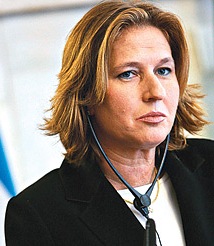Exit polls: Livni voted leader of Israeli ruling party
 Tel Aviv - Israeli Foreign Minister Tzipi Livni has overwhelmingly won Wednesday's primaries in the ruling Kadima party, giving her a good chance of becoming Israel's next prime minister and the second woman ever to run the country, exit polls predicted.
Tel Aviv - Israeli Foreign Minister Tzipi Livni has overwhelmingly won Wednesday's primaries in the ruling Kadima party, giving her a good chance of becoming Israel's next prime minister and the second woman ever to run the country, exit polls predicted.
Livni won between 47 and 49 per cent of the vote, according to three independent exit polls broadcast by Israel's Channel 2, Channel 10 and Channel 1 State Television stations.
Her main rival, hawkish Transport Minister Shaul Mofaz, obtained 37 per cent of the vote, all three polls predicted.
Public Security Minister Avi Dichter won some 7 to 8 per cent and Interior Minister Meir Sheetrit about 6 to 7 per cent.
The polling institutes commissioned by the television channels asked thousands of Kadima members to cast dummy ballots after having submitted their real votes. They did not immediately give margins of error.
First real results are expected by midnight, while the official results are due early Thursday. Livni needs at least 40 per cent of the vote to win in the first round.
The party primary is considered one of the most crucial in Israel's history. Some 74,000 registered members of Kadima - almost exactly 1 per cent of Israel's population - will be determining who might well become the country's next prime minister.
The victorious candidate will replace Olmert, who announced in July that he would quit the premiership, because of ongoing investigations against him for alleged corruption.
The primary could also be decisive for the peace process with the Palestinians, with Livni, Israel's chief negotiator and - although a centrist - a staunch advocate of a two-state solution to the Middle East conflict, likely to continue negotiations according to their current format.
Mofaz, by contrast, is a comparative hawk in the centrist party, who has openly and repeatedly said he opposes dividing Jerusalem and wants to postpone negotiations on a final peace deal.
Some 144 polling stations throughout the country opened their doors at 10 am (0700 GMT). They were due to stay open until 10 pm (1900 GMT), but voting was extended by
30 minutes after long queues were reported after working hours at a number of stations.
Until after office hours, turnout had been low, leading to concern among Livni supporters. Mofaz throughout the day and his campaign expressed confidence he would take the contest because he has greater influence with field activists able to bring in undecided voters and get unmotivated members to go out and cast their ballot. On Sunday he even predicted he would win with 43.7 per cent of the vote.
The turnout reached over 50 per cent shortly before voting ended.
The new Kadima leader will try to form a new coalition government, but if he or she fails, early elections by March 2009, a year ahead of schedule, are likely.
Olmert could in theory continue to lead at the head of a transitional government until then.
And senior Palestinian negotiator Saeb Erekat said Wednesday the Palestinians would continue their dealings with the Israeli premier "until the last hour." But both Palestinian negotiating team head Ahmed Qureia and President Mahmoud Abbas have expressed serious doubt an end-of-year deadline for a peace deal can still be met.
"I call on everyone to come and vote," Livni, 50, told reporters as she cast her ballot in Tel Aviv.
Livni has had a consistent, two-digit lead in opinion polls over Mofaz and a high voter turnout was seen as favourable to her.
"I am certain I will win. Wait for the results at midnight," said Mofaz, 60, a former defence minister and army chief of staff who has highlighted security as a top priority during his campaign, as he cast his vote in Kfar Saba, north-east of Tel Aviv and near his hometown of Kohav Yair.
Dichter, 56, a former head of the Shin Bet internal security organization, cast his ballot in the southern coastal city of Ashkelon after taking his daily early morning swim in the Mediterranean, while Sheetrit, 60, an experienced legislator, voted in Yavne, his hometown south of Tel Aviv.
Olmert, 62, would not reveal whom he voted for when he cast his ballot. He later in the evening told a gathering of students in Israel's southern Negev desert: "I decided to resign, with pain, not with pleasure, I must say, really with pain."
But, he added, "I know that there are still many things to do, that I wanted to do, that I believe I could have done. I have no bitterness. I have no anger."
If the Kadima primary is indeed decided in Wednesday's first round, Olmert will notify his cabinet of his intention to resign at its next session Sunday, a formal procedure required by law, his aides said Tuesday.
But they said the premier is not expected to formally hand in his resignation to President Shimon Peres before early October, because Peres is traveling to the UN General Assembly late this month.
Olmert's resignation, which will take effect 48 hours later, by law automatically means the resignation of his cabinet, which then becomes a caretaker government. (dpa)